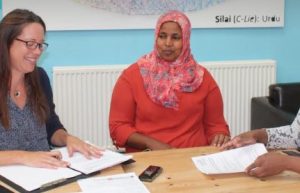Autism Independence and NIHR
Related content
Autism report targets Somali community
by Ella Rhodes
“It was like walking without knowing where I was going”: autism in the Bristol Somali community findings published
‘You are labelled by your children’s disability’
“It was like walking without knowing where I was going”
A Qualitative Study of Autism in a UK Somali Migrant Community by Fiona Fox, Nura Aabe, Katrina Turner, Sabi Redwood & Dheeraj Rai
British Psychological Society "Putting autism centre stage".
Ella Rhodes reports on a community project and art/science collaboration.
Inside, outside and in-between
.
Autism Independence and NIHR
